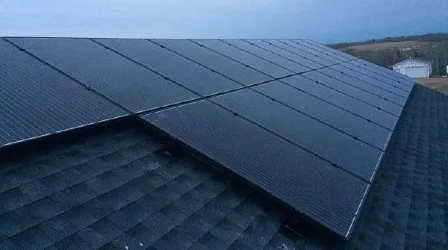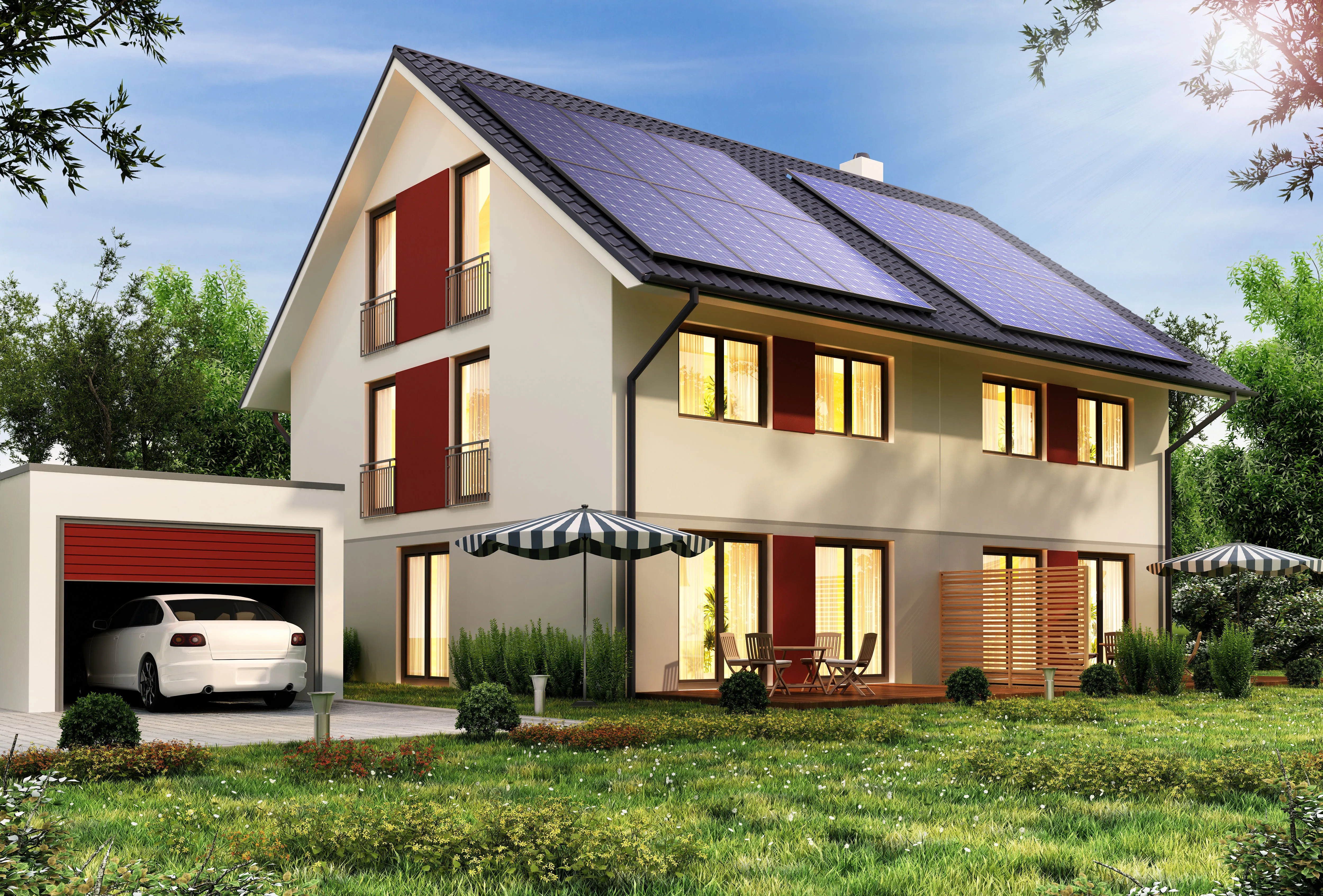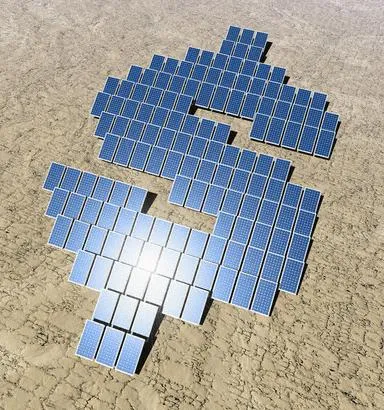Should I get a Solar Loan, Lease or Cash?
If you're considering going solar but aren’t sure whether to get a loan, lease, or pay cash outright for your solar energy system, this blog will help you make an informed decision.
Drawing on over six years of experience in solar and more than a decade in real estate, I’ve seen various situations and factors come into play—whether you're selling the home, refinancing, or planning to keep the property long-term for personal or rental use.
This article could potentially save you tens of thousands of dollars by helping you identify the best financing option for going solar. Choosing the wrong one for your situation could be costly, leading to setbacks and, in some cases, negative savings. I’ve condensed years of experience into this guide to give you the most value, so take a moment to read through—it’s worth the investment of your time.
Most solar companies and sales reps won't give you all the details I'm about to share in this article. My goal is simple: to provide you with the truth, so you can make the best decision for yourself. I believe that being well-informed leads to better choices, so let’s dive into this guide that breaks down the best solar options for your situation.
Is it worth paying cash for my solar system?
The answer is it depends, If you do have cash in hand, paying upfront in full offers benefits such as 0% interest, no dealer fees, and a typically ROI (Return on Investment) within 5-7 years. After that, the system is fully paid off from the savings and from there it’s essentially free electricity for the life of the system, with most panels performing at about 86% efficiency after 25 years, and home energy efficiency evolves over time, with newer more efficient appliances, you might now even need to add or replace panels for the next 60+ years, saving you more money than you can imagine based on rising inflation and utility rates.
On top of that, you will be able to claim the 30% federal solar tax credit and essentially save the tax deductions instead of having to give it to the solar lender and having a solar bill.
However, waiting until you have the full cash amount might not be worth it, as you’re already "renting" energy from your utility company with ever-increasing rates. In many states, utility bills have doubled in the past five years. As solar demand rises due to frustration with these increases, material costs are also likely to rise due to supply and demand and inflation.
Only about 5% of buyers with extra cash opt to pay 100% upfront for their solar systems. While paying cash can save you money on interest and dealer fees associated with solar loans, most homeowners prefer having a fixed, lower solar bill that eventually ends, compared to the rising, never-ending payments to utility companies.
When homeowners who didn’t put any money down or pay cash for their system ask about ROI, I explain that there isn’t one in the traditional sense—because there was no initial financial risk. With a solar loan or lease, you are essentially replacing your utility bill with a solar payment that will eventually end, which 95% of homeowners find more appealing since they already are paying a never ending and always increasing utility bill because they are renting their electric consumption from the monopoly utility companies.
The main reason 95% of homeowners choose the solar loan or lease option is simple: after reviewing their monthly utility bills and considering seasonal fluctuations to discover their actual utility bill average, they realize that even with loan interest, they will pay far less over time than continuing with their utility company.
Using an amortization schedule calculator, even a conservative 4-6% annual increase in utility rates (compared to the 15-20% yearly increases we’ve seen in the last five years in most states) shows homeowners save tens of thousands of dollars by going solar.
To ensure accuracy, you should compare your current average utility bill with the total monthly solar loan or lease payment. Keep in mind that some solar loans start with a lower payment, which could increase if you don’t claim the 30% federal tax credit and the loan is re-amortized without it. Also, factor in any fixed solar fees from your utility (e.g., Duke’s $30 or FPL’s $25 fixed maintenance fees), as well as possible insurance costs which can vary due to different policies with insurance providers (some friendly some not), applicable laws which vary state to state, in most cases it’s just a necessity to go over so you can reap the benefits of going solar.
The key consideration for most homeowners is whether the solar bill is lower than, or comparable to, their current utility bill. Once you switch to solar, you’ve locked in your energy production and shielded yourself from future utility rate hikes.
Loan vs. Lease: Which is Best for You?
Deciding whether to get a loan or lease depends on your personal financial situation since this is not a one-size-fits-all decision.
The first question I ask homeowners is whether they are in a fiscal position to pay taxes after applying all available deductions, such as mortgage interest and homestead exemptions. If you're a W2 employee or a business owner (1099), this is especially relevant. Business owners often have more write-offs and might not owe taxes for several years.
Why is this important? Because there is a 30% Federal Solar Tax Credit (FTC). If you purchase your solar system with cash or a loan, you can file Form 5695 to claim the deduction. You can find more information about this form on the IRS website here.
If you're in a position to claim your federal tax deduction within the next five years (the deadline), it usually makes more sense to get a solar loan rather than a lease.
Best Option if Refinancing or Selling Your Home in the Next 5 Years and You Can't Claim the 30% Federal Solar Tax Credit
Solar Leases
If you're unable to claim the 30% Federal Solar Tax Credit due to not having enough tax liabilities due to your current tax situation, a solar lease could be your best option. Leasing companies claim the tax credit, which allows them to have lower monthly payments compared to loans, since they claim the tax credit, they are able to offer you solar payments with 0 dealer fees and little to no interest rates.
For most homeowners, the goal is simple: saving money by switching from traditional utility companies to solar. A solar lease will provide the same or greater energy production for less than your current monthly utility bill.
At the end of the lease term (usually 25 years), you can choose to buy out the system, have it removed, or replace it with a new one. This flexibility makes it attractive, particularly for those who may sell their homes, allowing the future homeowner to decide what’s best.
Additionally, with the recent interest rate cuts by the Federal Reserve, many homeowners are considering refinancing. Unlike a solar loan, a lease won't affect your credit score or debt-to-income ratio (DTI), making it easier to refinance or sell your home. It only involves a UCC-1 filing (a lien on the solar equipment itself), so in case of default, the worst-case scenario would be the removal of the panels.
A solar lease simplifies the home-selling process as well, since potential buyers won't have to worry about assuming a loan or seeing their mortgage pre-approval reduced due to the added debt. For buyers, the lower utility costs compared to neighbors without solar can also be a selling point.
Solar Lease Options:
- Option 1: Solar Lease with a 2.9% Escalator
This option increases your payments by 2.9% annually but still offers a lower overall increase than the average 4% rise in utility costs. If you’re planning to sell within five years, this option provides the lowest upfront monthly payment.
- Option 2: Solar Lease with a 0% Escalator
Here, your monthly payment remains the same for 25 years, which means greater long-term savings. This may appeal to buyers, but even with a 2.9% escalator, the savings will still be significant compared to standard utility rates. Utility bills have risen by an average of 15-20% annually in states like Florida, Texas, and California.
The decision between these options depends on whether you prefer higher upfront savings (with a 2.9% escalator) or long-term stability (with a 0% escalator).
Just an adder to all of this, although you won’t qualify for the federal tax credit with a solar lease, it still offers significant upfront savings on your utility bills. This makes your home more appealing to buyers, especially compared to neighbors without solar. Since a solar lease doesn’t impact your credit score, it won’t affect refinancing or potential buyers' mortgage approvals so even if you can claim the 30% federal solar tax credit, it may still be more interesting to get a solar lease when selling or refinancing because of these benefits.
Most solar leases also allow you to buy out the system at fair market value after the 25-year term, which is usually a low cost. At that point, you or the new homeowner can decide to either extend the lease, get a new system, or buy out the old panels.
Best Options if Selling Your Home in the Next 5 Years and You Can Claim the 30% FTC
1. Higher APR, Lower Dealer Fee Loan
If you're planning to sell your home within the next five years and are eligible for the 30% Federal Tax Credit (FTC), opting for a higher APR loan with no dealer fees could save you a substantial amount. These loans allow you to use your home equity to pay off the loan without additional costs at the time of sale, potentially saving you $15,000 to $30,000 depending on the system size.
By paying off your solar loan during the closing process, you’ll make it easier to sell your home to potential buyers. Since 95% of buyers finance their homes rather than pay in cash, they won’t have to worry about their mortgage pre-approval being reduced by assuming your solar loan.
When marketing your home, you can highlight that the loan will be cleared at closing, using your home’s equity. This allows you to increase the sale price without paying extra dealer fees, which can range from 30%-36% on lower APR loans (like 3.99%). With a higher APR loan (around 7.99%), the dealer fees are much lower (5%-12%), and since this is an unsecured loan, no lien is placed on your home.
If refinancing and you can claim the 30% FTC but don’t plan on selling the property or pre paying the system off in 5 years or less, then a solar lease will continue to be the best option since it won’t affect your credit and impact in any way the refinancing of your home, if you really want to claim the 30% FTC and still prefer getting a loan as a preference to leases, then I would recommend to wait to refinance first, then get the solar loan, if it’s just a refinance and you plan to keep the property long term and don’t plan on paying it off in 5 years or less, go with the lower annual rate (apr) and higher dealer fee because this option will allow you to pay less interest overall In the span of 25 years.
Choosing a reputable solar company with a strong track record is crucial, as many solar companies don’t last long in the market.
A higher APR loan makes the process smoother for potential buyers, who will feel more comfortable knowing the loan will be paid off during the closing, removing concerns about how it might affect their mortgage approval.
If you want to compare solar loan interest your self by taking the total final solar system cost and the apr for each option I recommend using https://www.calculatestuff.com/financial/loan-comparison-calculator
Best Options if You Plan to Keep Your Home Long-Term and Can Claim the 30% FTC
1. Low APR, Higher Dealer Fee Loan
If you're staying in your home for the long term, a low APR loan (despite its higher dealer fees) could be your best bet. Over the course of a 25-year loan, the savings from a lower APR will add up, even though the upfront costs are higher.
It’s essential to use a loan comparison calculator to see how this option can save you tens of thousands in interest over time. The main appeal of this option is lower monthly payments that effectively replace your utility bill and let’s think positive, the higher dealer fee will be counter balanced with the fact that the 30% federal solar tax credit will increase since it’s based on the total system cost, and there is a cost to lower aprs, yes, the higher dealer fees.
2. PACE Loans (Florida and California Only)
PACE loans are a viable option for homeowners in Florida and California. These loans are attached to your property taxes, so they don’t affect your personal credit. They also typically offer 0% dealer fees, saving you upfront costs. However, be aware that selling or refinancing requires paying off the PACE loan in full, as it places a lien on your home.
Another interesting point if you live in any of these 2 states is that you can deduct the interest portion of the pace loan on your personal income taxjust like you can on the interest of your home mortgage.
3. Cash Payment
If you have the funds available, paying cash for your solar system is a great choice for this situation. You won’t incur any interest, and you’ll be able to claim the 30% federal tax credit. Cash purchases also eliminate the hassle of paying off the system when you sell or refinance.
4. Solar leases with a 0% escalator are a great option if you want the flexibility to replace your panels at the end of the lease, avoid affecting your credit score, and make selling or refinancing your home easier if that situation were to arise. This option is especially helpful if you’re interested in solar battery backup, which can be costly. Leases offer lower monthly payments since they don’t include dealer fees or interest, and you don’t need to worry about claiming the federal tax credit.
Conclusion
Choosing the best financing option for solar depends on your specific circumstances. If you’re planning to refinance or sell within five years, a solar lease or higher APR loan could be the best fit. For long-term homeowners, a low APR loan, PACE loan, or cash purchase might offer the most significant savings.
Take control of your energy savings now! Get a completely free, customized solar quote designed specifically for your home. No commitment, just straightforward advice on how much you could save. Click the “Free Solar Quote With Me” button at the top right, or reach out directly at [email protected] or (407) 813-5731. Don’t wait—start your journey to lower energy bills today!




